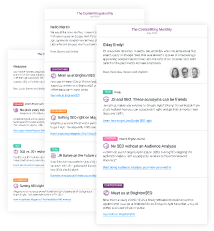All websites should be using Schema markup!
Since 2017, Google has been very clear that websites should implement structured data to increase the understanding of the website. Over the last two years we see continued investment from Google in structured data, through schema.org releases, new features, and additional reports.
Hi Martha! Can you tell us a little about yourself?
My name is Martha van Berkel, I am the CEO and CoFounder of Schema App (opens in a new tab). We are located in Guelph, Ontario, Canada (about an hour from Toronto).
Schema App empowers the Digital Marketer to own their Schema markup strategy through to implementation without ever writing code or engaging with IT. We are deep experts in everything Schema markup.
Schema App has a comprehensive offering that spans the full lifecycle, starting with strategy services through to implementation and maintenance as well as a game-changing analytics offering that allows marketers a granular view into which content is driving success.
Prior to co-founding Schema App, I worked at Cisco for 14 years. In my last role as a Senior Manager I was responsible for the global online support strategy and making Cisco's services APIs public. I understand large enterprise software adoption challenges, and have the fast thinking mind of an entrepreneur.
I have a degree in Applied Mathematics and Engineering, and studied Innovation and Strategy at MIT.
I do a monthly Podcast called Connecting the Digital Dots (opens in a new tab) where I have conversations with other thought leaders on the topic of search, Natural Language Processing, Semantic Search, and more.
When not having fun running a company, I am a Mom. My two kids keep me on my toes and we enjoy adventures by the sea, walks in the woods, and playing games. I am an avid rower, and enjoy a good green juice.
Why did you build Schema App?
My cofounder, Mark van Berkel, built Schema App in 2013 to solve his own problems with schema markup. At the time we were doing SEO for small and medium size businesses and he figured out that he could produce schema markup faster than he could write it. Which also meant that we could do it for our clients and still be profitable. He also has a background in semantic technology (knowledge graphs), so he found it fun to have a real world application of advanced tech.
However if you build something and no one knows about it, you don’t have a company. That’s where I come in. My role in Schema App was to get customers excited, buy the tool, adopt it, and support them in their Schema markup journey all while working with Mark to refine the capabilities, log bugs, and evolve it to the awesome suite of tools it is today.
What issue(s) does Schema App solve?
Schema App solves three primary problems for our customers:
- Writing Schema markup is time consuming and very technical, we produce it for them. This way SEOs that are not coders, can still do this advanced SEO strategy and have confidence their code is error free.
- Doing schema markup the traditional way requires development resource and IT release windows. Schema App allows digital marketing teams to remove or reduce this dependency, resulting in faster results and more time to focus on real work, instead of meetings to coordinate and then review/test/release. We do this by allowing Schema markup to be created in our Schema App Platform, then sending it to the website through a plugin, tag manager, or API integration.
- Schema markup is complicated. We provide email and high touch support to help our users understand this complex SEO strategy and help them find success.
What websites should be using Schema markup?
All of them.
Since 2017, Google has been very clear that websites should implement structured data to increase the understanding of the website. Over the last two years we see continued investment from Google in structured data, through schema.org releases, new features, and additional reports.
We suggest optimizing the elements of your website that represent the parts of your business that enable your goals and that customers need to find. If you follow our guide “How to Create a Schema Markup Strategy (opens in a new tab)” it helps you identify those key page (and page types), review which ones or other content could achieve a rich result, and then prioritize getting it released.
How do you leverage Schema for more organic traffic?
If you follow the steps we guide you on for the Schema Markup strategy, then the most important elements of your business will be better understood.
When you do your Schema markup, it is important to not only to map your content into Schema markup, but also to connect the content to other things in the business. For example, if you offer services, you want to make sure your services Schema markup refers to the provider and links to the organization. We have found that companies that create proper connected Schema markup get better long term results. You can learn more here: Connected Schema Markup and Knowledge Graphs (opens in a new tab).
What kind of results I’m talking about?
Schema Markup can impact results from the start of the funnel (clicks, impressions), through engagement (time on page, pages viewed per session), through conversion. Read more about the ROI of Schema markup (opens in a new tab).
What role does the future hold for Schema markup, or other forms of structured data?
In a recent video from John Mueller, he talked about how Schema markup provides “understanding” for search engines to help them match searchers intent in addition to contributing to rich results.
Just this past week (Nov 4-5 2019), Google Webmaster Tools held a conference where Barry Schwartz’s take away was:“[It] was apparent from the numerous talks at the conference was that Google will expand support for structured data to inform new experiences in the search results as well as the Assistant.
This includes adding new rich result types, above the numerous options already officially supported. It also includes Google improving and updating how it shows these rich results in the Google search results. So stay on top of these changes and try implementing appropriate structured data for your site.” (Source (opens in a new tab))
So Schema markup and structured data will be a part of our SEO future. I see it playing a much bigger role than just enabling rich results. Done properly, Schema markup results in a knowledge graph for company’s marketing information, in essence a marketing data layer.
As people start to interact with data and not websites, I see that the Schema markup could become the control point for managing your brands across these different machines. This would be a big change for the role of websites, where it then plays the role of container, but not in experience. The experience would be managed through the different interfaces, like voice assistants, connected cars, etc.
Why do you think Google changed their policy around the review snippets?
In Google’s blog about the change they spoke about trying “to make reviews and ratings more helpful and meaningful” and to “addresses some of the invalid or misleading implementations webmasters have flagged to us”. They also mention that “for many (schema.org) Types, displaying star reviews does not add much value for the user”.
So with that in mind, I believe they are trying to do the right thing. To have reviews show up when they are “true” and add value to the user. However, this is hard to do with general guidelines.
For example, Google has specifically called out that reviews that are “self-serving” will not be displayed for schema.org classes Local Business and Organizations. However, some Local Businesses and Organizations work diligently to capture reviews in a “true” and honest way.
Most recently we saw Physician (sub-class of Local Business) review rich results come back. Recognizing that Hospitals and Physicians are required to follow robust guidelines to capture reviews, this makes sense.
I imagine over time we will see some changes to the guidelines on reviews. In the meantime, I encourage people to keep their reviews on their content, and also to add Schema markup for them.
What are your thoughts on the recently announced FAQPage markup?
The introduction of the new FAQPage markup feature is not surprising with Google’s focus on answering questions for local businesses and voice.
The FAQPage markup puts the work effort on SEOs to map their content into simple question and answer format, which can then show up across the different search experiences.
Do you think we’re training Google’s machine learning algorithms?
Yes, I think that Google is learning as it crawls and consumes information. Just like other machines might be using structured data to learn how information is defined and connected.
If the answer to the question above is yes: is that a good or a bad thing?
It just is.
As consumers of information we want more and more advanced “services” to be performed by machines, and search engines. In order for them to do this they need to learn, connect and understand. So unless the world is about to stop evolving, I think this is a reality we need to accept.
Will there ever be a time when Google’s had enough training?
Based on where AI is at today, I think there is still a lot of training required to provide us with a robust, seamless service. The amount of data training will depend on what services Google is trying to provide to their users, through what surface/machine (voice, search, mobile, etc).
To keep updated on all things Schema, who do you follow, what newsletters do you read and what other sources of information do keep track off?
Well, follow me: @marthavanberkel (opens in a new tab)!
Additionally;
- I also like the perspective Aaron Brandley (@aaranged (opens in a new tab)) brings from a Semantic Tech side and of course my cofounder: Mark van Berkel (@vberkel (opens in a new tab)).
- I really like the Google patent perspective brought by Bill Slawski (@bill_slawski (opens in a new tab)).
- For machine learning and NLP I like Dawn Anderson’s perspective (@dawnieando (opens in a new tab)).



